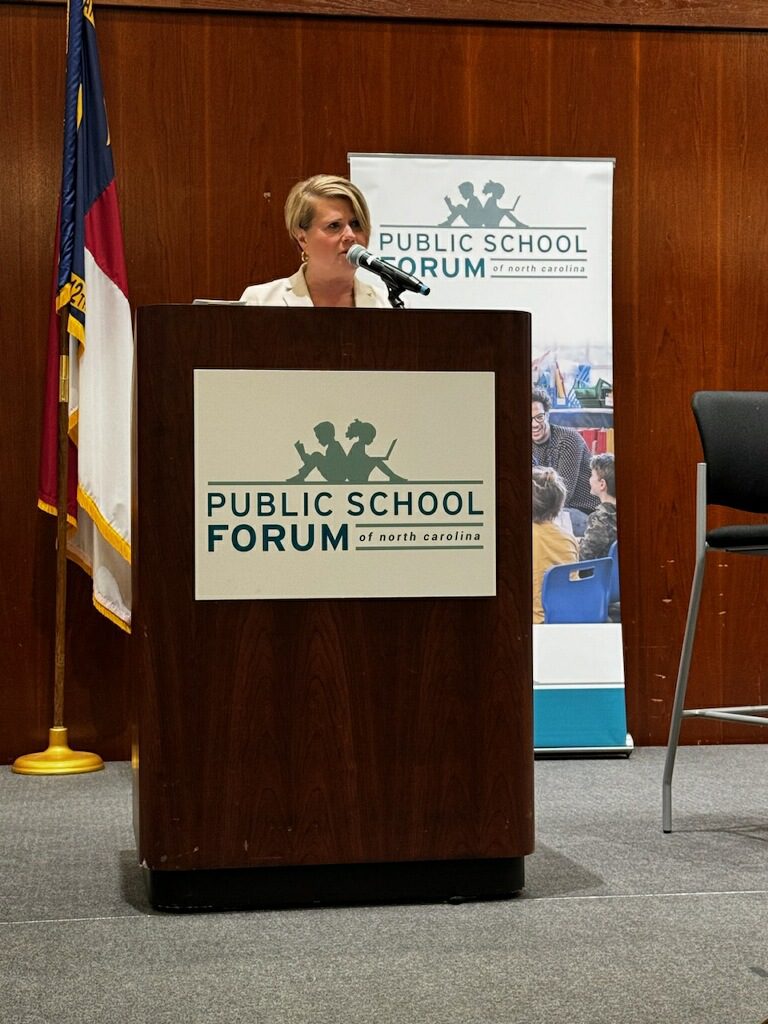
RALEIGH — The Public School Forum of North Carolina rolled out its education priorities and heard from various candidates during its annual “Eggs & Issues” event in Raleigh last week.
The top priorities of the Public School Forum of North Carolina (PSFNC), were nearly the same as in past years, including fair and competitive compensation for educators; growing, retaining and diversifying the teacher pipeline; addressing root causes of mental health and school safety crises; preparing students for the world they live in; and implementation of the Leandro Comprehensive Remedial Plan.
Lauren Fox, PSFNC’s senior director of policy and research, called for a 24.5% across-the-board pay raise for teachers. Fox also commented that the Parents’ Bill of Rights presented concerns about student mental health with districts unsure how to implement the law.
Fox also said preparing students for the world they live in is tied to “ensuring that schools are incorporating social emotional learning, culturally responsive pedagogy and curricula that are represented of our diverse student body.”
The event opened up with remarks from Democratic Gov. Roy Cooper, who spent most of his time railing against the expansion of the Opportunity Scholarship program (OSP) and criticizing the legislature for adding additional funds to clear the nearly 55,000 applicants on the waitlist.
Throughout his remarks, Cooper referred to the scholarship awards as a “shell game” and a “reverse Robin Hood scheme” that “steals money” from public schools.
Cooper accused legislators of “diverting hundreds of millions of taxpayer dollars to private school vouchers.”
“It is outrageous that this is their No. 1 priority,” Cooper said. “This is one of the first bills going through the General Assembly. This is the money we want to take off the top. This is the thing we say is most important.”
The governor also called the funding to end the waitlist “shockingly, shockingly irresponsible” before calling for a moratorium on any further expansion of the program.
The day before the PSFNC event, Cooper held a press conference with Democrat lawmakers calling for a moratorium on OSP expansion and highlighted House and Senate bills that were filed to enact such a moratorium.
Polling before and after the pandemic has historically shown opposing school choice options like the OSP as a losing issue. A Cygnal poll conducted in January 2024 of 600 likely N.C. voters showed 64% support the OSP, with 41.9% strongly supporting the program. In the same poll, more than 60% supported a model of funding students and not systems.
Cooper went on to cite teacher pay and per-pupil funding statistics from the National Educators Association (NEA), which is one of the two largest teachers’ unions in the country.
The NEA’s data released in April this year says North Carolina ranks 42nd in average starting teacher pay rates ($40,136) and 38th ($56,559) for overall average teacher pay. The state moved one spot from 37th to 38th in per-pupil spending ($13,173).
Data from the U.S. Department of Education and the Center for Education Statistics shows that nationally, between the 1969-70 and 2020-21 school years, per-pupil spending in inflation-adjusted dollars increased 152%, while teacher compensation remained relatively flat, increasing by just 8%.
In his remarks, the governor accused lawmakers of a “concocted myth that public schools are failing our children,” saying the opposite was the case and “legislators are failing our public schools.”
Arguably the strongest and most pointed set of remarks came from outgoing North Carolina State Superintendent Catherine Truitt, who followed the governor in the lineup.

Truitt set the tone for her remarks with her opening statement, saying, “Education has emerged as a contentious wedge issue in our political discourse.”
She went on to call out both political parties for using education for “framing campaigns and policies around buzzwords that inspire clicks and drive donations.”
“We’re at a critical juncture. There’s a big election ahead of us. The stakes are high because we are trying to recover from the most significant education event in our country’s history while the very nature of what it means to be workforce-ready changes by the day,” said Truitt. “But as someone who has had the privilege of leading the state’s K-12 system for almost four years, I want to underscore the need for our education leaders to take their eyes off the buzzwords and hot topics that drive news and viral videos.”
She went on to say, “This will mean doing away with what ‘sounds good’ in favor of doing good for students.”
“Buzzwords make for great soundbites, social media clicks and attack ads. But education is much bigger – and significantly more nuanced – than 280 characters,” Truitt said. “Buzzwords don’t allow for leaders to articulate their plan or path forward. And their use shortchanges us on the opportunity to hear about whether leaders have a credible chance at executing a coherent, long-term vision.”
During her comments, Truitt underscored the work she and her team did was not on “sexy” topics the media wants to cover but instead were about the necessary issues like reading.
“When it came to reading, data pre-pandemic showed us that 67% of eighth graders started high school not reading proficiently. Fourteen percent of African American eighth graders started high school reading proficiently,” said Truitt. “This is a civil rights crisis. This figure had not budged in many decades, regardless of the party in power and dollars spent.”
She noted that the Science of Reading-based LETRS program implemented following the pandemic has seen North Carolina third graders outperform the nation on benchmarks.
In her closing statements, Truitt also took a shot at Michele Morrow, the Republican she lost to in the primary who campaigned on divisive issues like Critical Race Theory and Social Emotional Learning, as well as focusing on school safety.
“I hope we can rally behind education leaders who take the time to show up and share their vision independent of buzzwords,” said Truitt.
Morrow’s opponent, Democrat Maurice “Mo” Green, had the forum all to himself due to Morrow’s absence.
Green’s campaign has criticized Morrow for her lack of education administration credentials, however, Green admitted during his remarks he got his start as a school board lawyer. He also noted laws were changed that allowed a person like himself with no education background to become superintendent of Guilford County Public Schools.
“I am told that I am the first nontraditional superintendent in the state of North Carolina,” Green said. “The law had to actually change to allow me to become a superintendent.”
He quickly added that the law “changed a few years before, so it wasn’t just me because of me.”
During his remarks, Green, who said his style is to ‘hire good people and get out of the way,’ also recited the NEA statistics as well as outlining why he got into the race.
Green said he decided to run because he saw the legislation expanding the OSP and because Cooper asked him to.
“I thought to myself, ‘What are we doing in our state that now anyone can get a voucher, regardless of income?’ I thought, ‘We cannot do this,’” Green said. “And so I was blessed to be able to have a conversation with Gov. Cooper where he asked me to consider running for this position.”
Green also touted his position as executive director at the Z. Smith Reynolds Foundation, an organization which has funded left-leaning organizations in the state for decades.
“There would not be a consistent and continuing Leandro litigation but for the Z Smith Reynolds Foundation because it funds the low wealth plaintiff districts in that litigation,” he said.
The event also featured other candidate matchups that included House District 24 and Senate District 13, as well as gubernatorial candidates.
House District 24 is a contest between Rep. Ken Fontenot (R-Wilson), the incumbent, and his Democratic challenger Dante Pittman. Fontenot was unable to attend due to an unforeseen scheduling circumstance that morning.
Senate District 13 is between incumbent Sen. Lisa Grafstein (D-Wake) and Republican Scott Lassiter, a superintendent in Wake County Public Schools.
Questions from PSFNC to Republican Lt. Gov. Mark Robinson and Democrat Attorney General Josh Stein capped off the event. Both men are vying to become the next governor of North Carolina.
Stein was unable to attend and prerecorded his answers to the questions posed by PSFNC. Both men were given the same three questions.
Robinson said being there at the event was important because the economy is built on pillars and that those pillars are “public education, public safety, health care, infrastructure and housing.”
“If any of those things are weak, your economy is going to be weak, and quite possibly the future of your economy is going to be weak,” said Robinson. “And there’s no place that’s more important than that when it comes to education.
“I know it may sound kind of old and antiquated, outdated maybe to some, but I truly believe that the basics are still the foundation of education: Reading, writing and mathematics,” Robinson said of what his education priorities should he be elected governor.
Robinson also said the state needs to take better care of teachers.
“Our teachers literally hold the future of this state in their hands, and so we have got to do what we need to do to make sure they are paid for, that they are respected and they are protected,” said Robinson, later remarking, “We’ve got to pay our teachers better.”
On school safety, Robinson said there is a “systemic problem with teachers not feeling safe in the classroom” that needs to be addressed.
The lieutenant governor also said he believes “adult education holds the key to turning around some of the wage gaps that we see in some of our communities.”
Like Truitt, Robinson also said when it comes to education, it is important to “leave politics out of this and invite people of all political stripes to the table.”
During his prerecorded interview, Stein also attacked the OSP and the legislature as well as calling the state of education funding a “recipe for long-term disaster.”
“Public schools are perhaps the most important institution we have in North Carolina,” said Stein. “And what is heartbreaking is how the current political leadership in North Carolina and the General Assembly is failing.”
Stein also talked about “adequately” funding schools and how the Leandro Comprehensive Remedial Plan would take care of that issue, citing his office “helped to negotiate that resolution with the plaintiffs.”
“Unfortunately, we’ve got a legislature that is embracing private school voucher scheme to take money out of public schools, to put it into the pockets of wealthy folks sending their kids to unaccountable private schools,” Stein said.
Stein said he has “no problem with any parent deciding what’s in the best interest for their child,” but he does have a problem with “underfunded” public schools.
“That we’re going to take money out of those public school kid backpacks and put them into the bank accounts of very wealthy people who are sending their children to these elite private academies … kids who never spent a day in North Carolina public schools,” Stein said. “It is a reverse flow of resources.”
Stein also called mental health staff in schools “woefully” underfunded. He said those who think there is “some vast, wasteful amount of money” in education budgets that could be redirected to teacher and mental health worker compensation was “baloney.”



